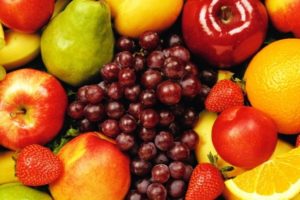 Each year, nearly 1.5 million Americans are diagnosed with cancer; there are more than 500,000 annual deaths. Right now, approximately 35% of Americans have a possibility of developing cancer in their lifetime. It appears that poor dietary habits contribute to the cause of the six most common types of cancer. Certain food , including fruits, contain health -promoting compounds that may slow tumor growth and reduce certain side effects of treatment to help ease your road to recovery.
Each year, nearly 1.5 million Americans are diagnosed with cancer; there are more than 500,000 annual deaths. Right now, approximately 35% of Americans have a possibility of developing cancer in their lifetime. It appears that poor dietary habits contribute to the cause of the six most common types of cancer. Certain food , including fruits, contain health -promoting compounds that may slow tumor growth and reduce certain side effects of treatment to help ease your road to recovery.
Fruit Choices for those With Cancer
Filling your diet with nutritious foods, including fruits , helps supply your body with vitamins, minerals and antioxidants throughout your cancer treatment. When being treated for or recovering from cancer your food choices are incredibly important. Cancer treatments like chemotherapy and radiation cause many side effects that can be worsened or improved by what you eat and drink.
Tailor Your Fruit Choices to Your Specific Symptoms
If you are having difficulty swallowing pureed fruits or fruit smoothies are good options. If you are experiencing constipation eat fruits rich in fiber which can promote regularity. Citrus fruits may irritate mouth sores and worsen the feeling of dry mouth. Whole fruits like apples, apricots and pears are hard for people with cancer to eat due to mouth sores, difficulty swallowing, dry mouth or nausea. Some foods can worsen or improve side effects of cancer treatment.
- Blueberries – Blueberries are incredibly healthy and nutritious. They boost your heart health, brain function and numerous other aspects of your body. What’s more, they’re sweet, colorful, and easily enjoyed. They pack plenty of fiber, vitamin C, and manganese into each serving. Rich in antioxidants and have been well studied for their cancer-fighting effects. Blueberries may also help alleviate chemo brain… a term used to describe problems with memory and concentration that some people experience during cancer treatment and recovery.
- Oranges – Just one medium orange can meet and exceed the daily need for vitamin C. Oranges also supply thiamine, folate, and potassium. Vitamin C plays a key role in immunity and can help strengthen your immune system during and after cancer treatment. They can help reduce cancer cell growth and increase iron absorption.
- Bananas – Bananas can be a great dietary addition for those recovering from cancer. If you have a swallowing difficulty they are also a good source of many important nutrients like vitamin B6 and C. Bananas also contain pectin which can be beneficial for those experiencing diarrhea caused by cancer treatment. The pectin may help protect against the growth and development of colon cancer cells.
- Grapefruit – Grapefruit is a fruit loaded with antioxidants, vitamins, and minerals. The antioxidants like lycopene, which has anticancer properties is included and may reduce some side effects of cancer treatments. Is has also been shown to increase blood flow to the brain, which may ease chemo brain. One thing you must keep in mind with grapefruit is it may interfere with certain medications, so it is best to talk to your doctor before adding adding it to your diet.
- Apples – Apples are one of the most nutritious fruits. Each serving contains fiber, potassium and Vitamin C. Vitamin C acts as an antioxidant to support immune function and fight cancer cell growth. Apples can help promote regularity, reduce fluid retention and support immune health.
- Lemons – Known for their sour taste and signature citrus scent, lemons deliver a burst of vitamins, minerals, and antioxidants in every serving. Certain compounds in lemon including limonene could boost your mood and fight stress to combat depression and anxiety. They have been shown to inhibit the growth of cancer cells in test-tube studies.
- Pomegranates – Pomegranates are high in vitamin C, fiber, vitamin K, folate, and potassium. Pomegranates may improve your memory and reduce joint pain, both of which are common side effects of cancer treatment.
- Mulberries – Mulberries are one of the few fruits rich in both vitamin C and iron, which may help protect against anemia caused by cancer treatments. They also contain lignins, which may increase immune function and possess anticancer properties. Additional studies are needed to evaluate if eating mulberries in normal amounts may be beneficial during and after cancer treatment.
- Pears – Pears like other fruits, pears may contain powerful cancer-fighting compounds. In fact, a study in over 478,00 people showed that a higher intake of apples and pears was associated with a lower risk of developing lung cancer. Pears are rich in copper and contain anthocyanins, which have been shown to reduce cancer growth in test tube studies.
- Strawberries – Strawberries are a favorite among fruit lovers. They are rich in vitamin C, folate, manganese, and potassium along with antioxidant compounds like pelargonidin. Strawberries are rich in antioxidant and may help decrease cancer cell growth. Ripe berries are also soft, making them a good choice for those with mild swallowing difficulties.
- Cherries – Cherries are a good source of antioxidants like beta carotene, lutein, and zeaxanthin… all of which can benefit your health. Each serving supplies a dose of vitamin C, potassium, and copper. An animal study for tart cherries reduced the growth of colon cancer cells in mice. Additional research is needed to evaluate if these finding also apply to humans. Being rich in antioxidants cherries have been shown to decrease the growth of cancer cells in test tube and animal studies.
- Blackberries – Blackberries contain antioxidants, including ellagic acid, gallic acid, and chlorogenic acid. They are high in vitamin C, manganese, and vitamin K. Test tube and animal studies show that they may also promote brain health, which could prevent certain side effects of cancer treatment.
The Bottom Line
As new research continues to emerge, it has become increasingly clear that your diet can have a major impact on your risk and comfort during treatment of cancer. Although there are many foods that have potential to reduce the spread and growth of cancer cells, current research is mostly limited to test-tube, animal and observational studies. More studies are needed to understand how these foods may directly affect cancer development in humans. In the meantime, it’s a safe bet that a diet rich in fruit and vegetable paired with a healthy lifestyle, will improve many aspects of your health and can keep you feeling your best and get you started on the road to recovery.
Synergy Holistic Health Helps Clients With Whole Food Nutrition and Response Testing
Nutrition Response Testing is an interesting and fun way to learn what supplements your body needs and what your nutritional priorities are for health and healing. It is a way of communicating with the body using a specific type of muscle testing called kinesiology. Nutrition Response Testing also tries to identify if there is something interfering with the body’s communication system or interfering with its ability to heal.
>> Learn More
Contact us (859-525-5000) for more information -or- request and appointment!
—
 About Synergy Holistic Health Center
About Synergy Holistic Health Center
SYNERGY Holistic Health Center supports you in your journey towards health, happiness, and wholeness, and to provide a safe space for that transformation to unfold. Our commitment is to honor you and your choices, and to provide guidance, education, and skills to support your goals so that you can experience your optimum health and highest personal potential.
> Learn More

